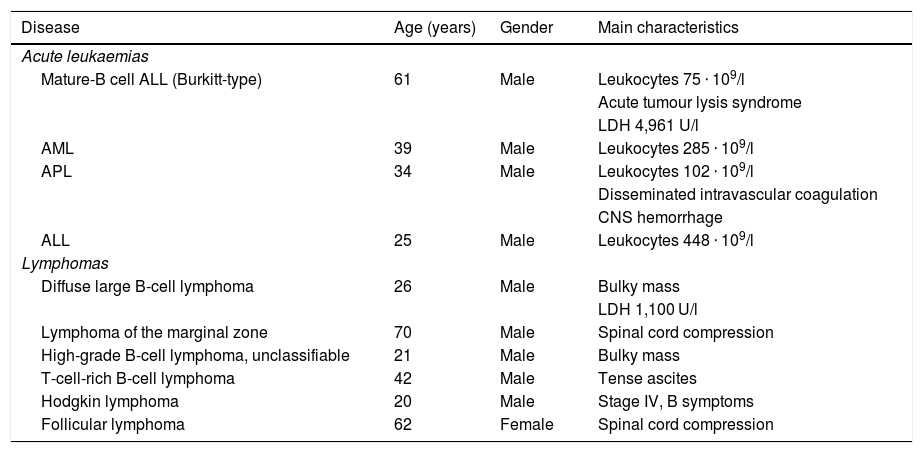In December 2019, the appearance of the coronavirus disease (COVID-19) was detected in Wuhan, China, and since then it has spread extensively, turning this infection into a pandemic. The healthcare system has mobilised a large amount of healthcare resources to control this pandemic, which has had a major impact on hospital care for patients, especially during the months of March and April 2020.1 After riding out the pandemic's acute phase, one of the consequences is the great impact it has had on the care of patients afflicted with diseases other than COVID-19 infection, including cancer. Apart from the delays in population screening programmes, rapid diagnostic circuits, and diagnostic and therapeutic surgical interventions, there have also been delays in medical consultations in patients whose eventual diagnosis is cancer.2,3 This has been due not only to the collapse of the health system, but also because patients shelved or postponed their primary or hospital care visit until their clinical manifestations were intolerable. This has meant that in the case of malignant haemopathies with their frequently acute course, patients are being diagnosed in more advanced stages with the prognostic implications this entails. This fact has been widely commented by professionals but has barely been analysed. The objective of this study was to analyse the characteristics of patients newly diagnosed with acute malignant hemopathies, seen in a Haematology department of a tertiary hospital, in an area with a high incidence of COVID-19 infection.3
In March and April 2020, 17 patients were diagnosed with acute malignant haemopathies (10 acute leukaemias and 7 lymphomas). The main prognostic characteristics are shown in Table 1. Four patients with acute leukaemias presented poor prognostic factors (hyperleukocytosis, disseminated intravascular coagulation, cerebral haemorrhage) and in 5 cases the patients suffered severe infections at the time of diagnosis. Six of the 7 lymphoma patients also had unfavourable prognostic characteristics, such as bulky masses and marked elevation of serum LDH, and two patients had spinal cord compression.
Main characteristics in malignant haemopathies diagnosed during the COVID-19 pandemic.
| Disease | Age (years) | Gender | Main characteristics |
|---|---|---|---|
| Acute leukaemias | |||
| Mature-B cell ALL (Burkitt-type) | 61 | Male | Leukocytes 75 ⋅ 109/l |
| Acute tumour lysis syndrome | |||
| LDH 4,961 U/l | |||
| AML | 39 | Male | Leukocytes 285 ⋅ 109/l |
| APL | 34 | Male | Leukocytes 102 ⋅ 109/l |
| Disseminated intravascular coagulation | |||
| CNS hemorrhage | |||
| ALL | 25 | Male | Leukocytes 448 ⋅ 109/l |
| Lymphomas | |||
| Diffuse large B-cell lymphoma | 26 | Male | Bulky mass |
| LDH 1,100 U/l | |||
| Lymphoma of the marginal zone | 70 | Male | Spinal cord compression |
| High-grade B-cell lymphoma, unclassifiable | 21 | Male | Bulky mass |
| T-cell-rich B-cell lymphoma | 42 | Male | Tense ascites |
| Hodgkin lymphoma | 20 | Male | Stage IV, B symptoms |
| Follicular lymphoma | 62 | Female | Spinal cord compression |
ALL: acute lymphoblastic leukaemia; AML: acute myeloblastic leukaemia; APL: acute promyelocytic leukaemia.
The collapse of the healthcare system in regions with a high incidence of COVID-19 infection, such as Barcelona, has led to the hospital system focusing mainly on the care of COVID-19 patients who presented clinical manifestations of varying severity and who required hospital admission or support in intensive care units. This has greatly affected the healthcare of high health impact diseases such as cardiovascular diseases and cancer. This fact, together with the reluctance of patients to go to hospitals practically saturated with COVID-19 patients, has determined that these diseases are frequently diagnosed in more advanced stages, with the prognostic consequences that this entails. In the cases of acute malignant haemopathy analysed in this study, it should be noted that most share characteristics indicative of a delay in diagnosis, such as hyperleukocytosis in acute leukaemias and bulky tumour masses in lymphomas. And for patients with established spinal compression whose chances of functional recovery are extremely low, this is even more disturbing.
The COVID-19 pandemic is posing unprecedented challenges and its trajectory remains uncertain. However, during this time of controlling the expansive phase, we must strive to quickly return to normal in such sensitive areas of health care as cancer diagnosis and treatment.2,4,5
Please cite this article as: Franch-Sarto M, Torrent Catarineu A, Ribera Santasusana J-M. Aumento de la gravedad de las hemopatías malignas agudas diagnosticadas durante la pandemia COVID-19. Med Clin (Barc). 2020;155:269–270.







